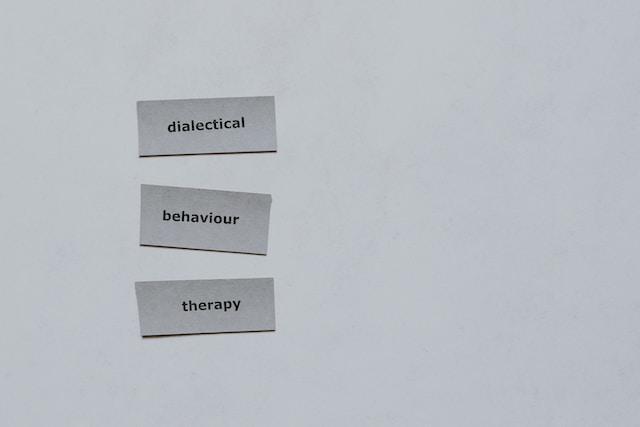Unlocking Healing Courses: DBT London Supplies Specialized Assistance
Unlocking Healing Courses: DBT London Supplies Specialized Assistance
Blog Article
Harnessing the Power of Dialectical Practices Treatment (DBT) Providers for Lasting Psychological Equilibrium and Improved Relationships
In a globe where psychological health and keeping healthy and balanced relationships are important elements of a satisfying life, the use of Dialectical Behavior Treatment (DBT) solutions has actually arised as a sign of hope for lots of people. The structured and evidence-based approach of DBT offers a pathway towards lasting emotional equilibrium and enhanced interactions with others.
Comprehending the Core Principles of DBT
Dialectical Habits Therapy (DBT) is started upon a set of core principles that underpin its therapeutic strategy to promoting psychological balance and emotional well-being. Mindfulness is one more core principle of DBT, focusing on being totally present in the moment without judgment.
Validation is also integral to DBT, highlighting the value of recognizing and approving one's experiences and feelings as valid. By incorporating these core principles into therapy, DBT offers a effective and extensive method to promoting emotional wellness and psychological durability.
Establishing Psychological Guideline Skills
Psychological law abilities are vital components of Dialectical Behavior modification (DBT) that enable individuals to properly handle their emotions and browse challenging scenarios with resilience. These skills encompass the capacity to recognize and recognize one's emotions, endure distress, control intense sensations, and act in accordance with individual worths even despite emotional chaos. Establishing psychological guideline skills entails discovering mindfulness techniques to remain present in the moment, comprehending the triggers that lead to psychological dysregulation, and executing coping approaches to modulate emotional reactions.

Via DBT services, individuals can grow a deeper understanding of their feelings, recognize patterns of habits that add to emotional distress, and get practical tools to control their sensations constructively. By honing these skills, people can improve their psychological knowledge, boost impulse control, and foster healthier connections. Eventually, understanding psychological policy brings about higher psychological security, increased self-esteem, and an increased capacity to browse life's challenges with composure and versatility.
Enhancing Interpersonal Efficiency

One key element of boosting interpersonal effectiveness in DBT is learning to acknowledge and manage emotions in social communications (DBT London). By raising psychological recognition, individuals can reply to others in a much more compassionate and understanding means. In addition, DBT stresses the value of exercising mindfulness in interpersonal relationships, encouraging individuals to be present in their interactions and completely involve with others

Practicing Mindfulness Techniques
Developing a regular mindfulness practice is crucial for people going through Dialectical Behavior Treatment (DBT) to cultivate psychological regulation and boost their interpersonal effectiveness. Mindfulness strategies, a core component of DBT, entail taking notice of the existing moment without judgment. Through mindfulness, people can become extra familiar with their thoughts, emotions, and physical sensations, enabling them to reply to circumstances with greater quality and control.
An additional vital facet of exercising mindfulness in DBT is the principle of extreme acceptance. Radical acceptance involves fully embracing reality as it is, even when it is agonizing or hard. By approving the here and now moment without judgment, individuals can reduce their suffering and include positive adjustment.
Using DBT Methods in Day-to-day Live
Structure upon the foundation of mindfulness techniques such as meditation and extreme approval, individuals can integrate DBT approaches right into their day-to-days live to foster psychological equilibrium and improve their interpersonal abilities. One efficient DBT approach is using dialectics, which urges people to find the go center ground in between two opposing feelings or thoughts. By exercising dialectics in everyday interactions, people can find out to confirm their very own feelings while additionally thinking about the perspectives of others. An additional essential DBT ability for day-to-day live is distress resistance, which includes finding out exactly how to cope with intense feelings without turning to hazardous actions. This can be accomplished through methods such as self-soothing tasks, disturbance techniques, or boosting the minute. Furthermore, interpersonal performance skills showed in DBT can aid individuals connect their requirements assertively, established limits, and maintain healthy and balanced relationships. By continually applying these DBT strategies in life, individuals can experience lasting psychological balance and boost their overall well-being.
Conclusion
Finally, taking advantage of the power of Dialectical Practices Treatment (DBT) services can result in sustainable emotional balance and enhanced connections. DBT London. By recognizing the core principles of DBT, creating psychological law abilities, enhancing social performance, practicing mindfulness techniques, and applying DBT strategies in day-to-day live, individuals can experience significant improvements in their overall health and relationships. The holistic strategy of DBT offers beneficial devices and methods for handling emotions and building healthier connections with others
Psychological regulation skills are necessary elements of Dialectical Habits Therapy (DBT) that make it redirected here possible for individuals to successfully manage their emotions and browse difficult circumstances with resilience.Through DBT services, people can grow a deeper recognition of their feelings, recognize patterns of behavior that add to psychological distress, and obtain functional devices to manage their feelings constructively.Developing a consistent mindfulness method is crucial for individuals undertaking Dialectical Behavior Therapy (DBT) to grow emotional law and improve their interpersonal performance.Building upon the structure of mindfulness methods such as meditation and extreme acceptance, people can integrate DBT strategies right into their everyday lives to foster psychological balance and improve their social skills. By understanding the core concepts of DBT, establishing psychological policy abilities, enhancing more social effectiveness, exercising mindfulness techniques, and using DBT strategies in everyday life, people can experience significant enhancements in their total well-being and partnerships.
Report this page